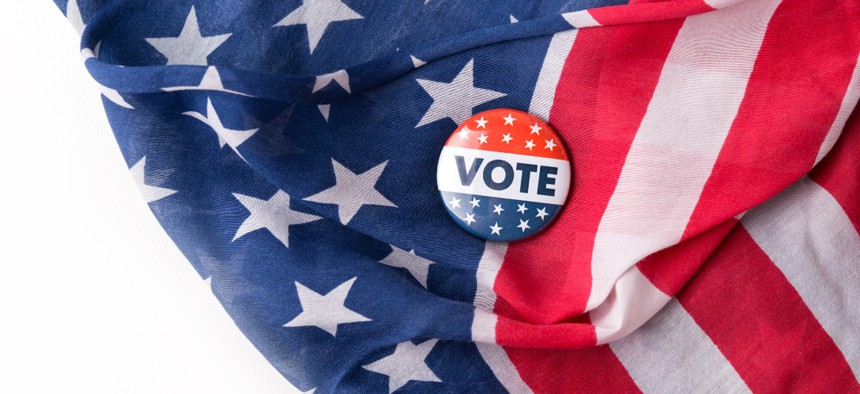
Prohibiting reelected or lame duck presidents from engaging in certain activities for a little over a month would help safeguard the presidency. Yulia Naumenko / Getty Images
Guardrails Are Needed to Help Protect the Integrity of the Post-Election Presidency
A few restrictions would help prevent aggrieved lame duck presidents from hijacking the functions of the executive branch.
Revelations of presidential initiatives to undermine the result of the 2020 election are worrisome because this could happen again, absent clear and immediate restrictions to prevent the risks to national security and proper order associated with this type of behavior in the post-election period. Perhaps the need for such guardrails was never anticipated and reliance on the presence of individuals of high character in positions of authority was good enough. Sadly, it’s not any more.
The type of behavior that must be prevented is characterized by the efforts made in the 2020 post-election period to appoint a compliant acting attorney general. If successful, this would have facilitated the attempt to undermine the result of the presidential election. Absent the integrity of key officials at the Justice Department, the appointment and its consequences might have been achieved. It is also of note that acting officials were appointed at other executive branch agencies with critical national security missions, such as the Defense Department, who were similarly positioned to take consequential actions if they were to have succumbed to inappropriate presidential direction and pressure.
Steps to address this predicament should include the institution of new restrictions that would prevent an aggrieved lame duck president from hijacking the function of the executive branch. This includes, but is not limited to, forestalling the appointment of officials to do the president’s will at the expense of the safety and security of the nation. These prohibitions would become effective from the date of the presidential election through either the date of Electoral College certification (in the case of certification of a second term) or Inauguration Day (when there is a change in administration).
In effect, a reelected president would simply have slightly more than a one-month pause in certain activities. A lame duck president would be stopped from that point until the end of his or her term. An incumbent president who is not running for reelection would be exempt from these prohibitions.
Prohibited actions would include the following:
- Political appointments;
- Changes to succession plans;
- Political to career conversions; and,
- Issuance of presidential directives, executive orders or other forms of communications requiring actions related to the election.
Additional actions should be identified and considered “conditionally prohibited actions” that could be taken only with congressional or Senate approval.
Further, to eliminate the possibility of circumventing the prohibition on political appointments in the post-election period, the tenure of previously appointed acting political officials would end on Election Day. During the period of prohibition, responsibilities associated with emerging vacant positions would be handled by following untampered normal succession plans or assignment to appropriate career officials, similar to protocols followed in presidential transitions.
Since the January 6th Committee issued its report, many commentators have referenced the Vacancies Act as ripe for revision. Along with the Presidential Transition Act, these acts would be logical and efficient vehicles for achieving the needed reforms.
There would likely be resistance to instituting even these limited, temporary constraints. However, it is not without precedent to sacrifice a measure of efficiency to prevent political abuse. Federal officials operate under extensive laws that protect the integrity of functions that have historically been subject to unscrupulous political influence, such as hiring and procurement. The commonsense prohibitions suggested above are demonstrably justified by considering what they would have prevented had they been in place prior to the 2020 presidential election.
The January 6th Committee did outstanding work in many respects, but its final report was light on recommendations—only three pages out of an 845-page report and very little that was expressly preventative. Adding non-partisan, good government recommendations like those suggested here can build on the committee’s work and help to safeguard the presidency and the country in the future. Let’s hope there are advocates for doing so.
Linda M. Springer is a former director of the Office of Personnel Management and a fellow of the National Academy of Public Administration.






